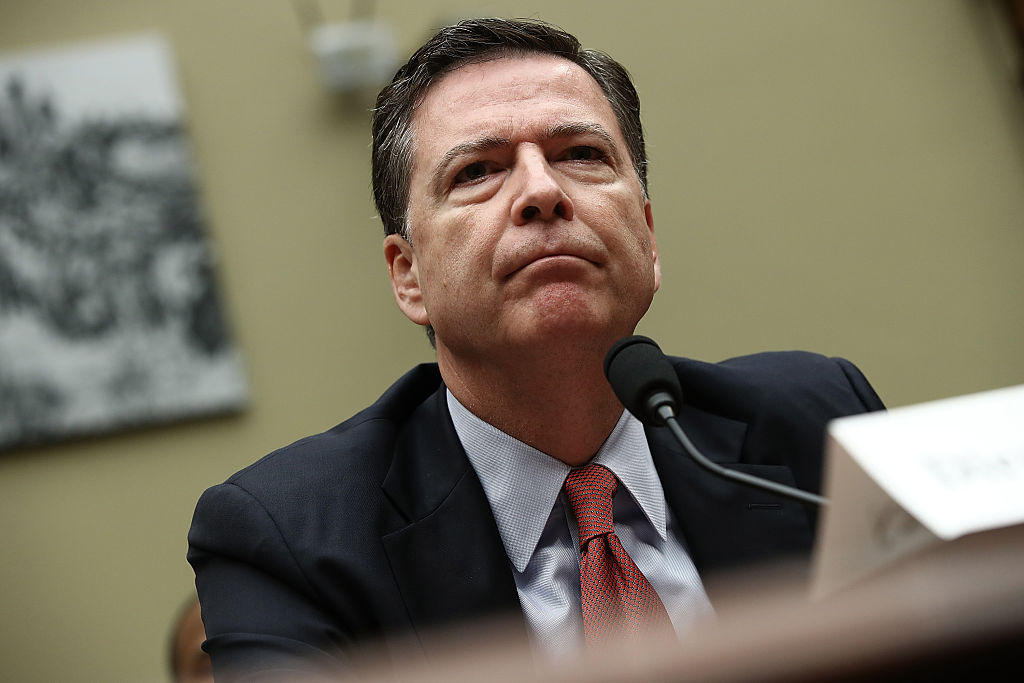The Clinton camp is furious at the 'flimsy' FBI rationale for pre-election warrant in unsealed documents


A free daily email with the biggest news stories of the day – and the best features from TheWeek.com
You are now subscribed
Your newsletter sign-up was successful
On Tuesday, a federal judge unsealed the search warrant and related documents used by the FBI to justify reactivating its investigation into Hillary Clinton's private email server, less than two weeks before the presidential election. The Oct. 30 warrant request came two days after FBI Director James Comey took the unusual and controversial step of informing Congress and the public that agents had found emails that "appear to be pertinent" to the closed Clinton investigation. Two days before the election, Comey said the FBI had found nothing new and incriminating.
The unsealed affidavit, sworn out by an FBI official whose name was redacted, seems to argue that because the bureau's earlier investigation had uncovered classified information in emails to Clinton and aide Huma Abedin, and a seized laptop owned by Abedin's estranged husband, Anthony Weiner, contained emails to Abedin from the time period she was in regular contact with Clinton, "there is probable cause to believe the [laptop] contains correspondence" with classified information. "The Subject Laptop was never authorized for the storage or transmission of classified or national defense information," the affidavit added.
The new documents "reinforce the impression that when the bureau revealed less than two weeks before the election that agents were again investigating Clinton, they had no new evidence of actual wrongdoing," The Washington Post says. Several outside lawyers said the FBI likely met the low bar of "probable cause" in its warrant request, and U.S. Magistrate Judge Kevin Fox was within bounds to sign off on the search. But the lawyer who requested the documents, E. Randol Schoenberg, said after reading them Tuesday he was "appalled" at the lack of any evidence a crime might have been committed. "There's nothing other than 'we'd like to look at it,' and that's not the standard for probable cause," he told Courthouse News Service.
The Week
Escape your echo chamber. Get the facts behind the news, plus analysis from multiple perspectives.

Sign up for The Week's Free Newsletters
From our morning news briefing to a weekly Good News Newsletter, get the best of The Week delivered directly to your inbox.
From our morning news briefing to a weekly Good News Newsletter, get the best of The Week delivered directly to your inbox.
Given the stakes — the election, plausibly — the Clinton camp was furious. Campaign spokesman Brian Fallon said on Twitter that the documents show that "Comey's intrusion on the election was as utterly unjustified as we suspected at time," adding that it's "salt in the wound to see FBI rationale was this flimsy." Clinton lawyer David Kendall criticized the "extraordinary impropriety" of Comey's vague Oct. 28 letter, "which produced devastating but predictable damage politically and which was both legally unauthorized and factually unnecessary." We may have to wait for Comey's autobiography to hear his side.
A free daily email with the biggest news stories of the day – and the best features from TheWeek.com
Peter has worked as a news and culture writer and editor at The Week since the site's launch in 2008. He covers politics, world affairs, religion and cultural currents. His journalism career began as a copy editor at a financial newswire and has included editorial positions at The New York Times Magazine, Facts on File, and Oregon State University.
-
 Key Bangladesh election returns old guard to power
Key Bangladesh election returns old guard to powerSpeed Read The Bangladesh Nationalist Party claimed a decisive victory
-
 Judge blocks Hegseth from punishing Kelly over video
Judge blocks Hegseth from punishing Kelly over videoSpeed Read Defense Secretary Pete Hegseth pushed for the senator to be demoted over a video in which he reminds military officials they should refuse illegal orders
-
 Trump’s EPA kills legal basis for federal climate policy
Trump’s EPA kills legal basis for federal climate policySpeed Read The government’s authority to regulate several planet-warming pollutants has been repealed
-
 Judge blocks Hegseth from punishing Kelly over video
Judge blocks Hegseth from punishing Kelly over videoSpeed Read Defense Secretary Pete Hegseth pushed for the senator to be demoted over a video in which he reminds military officials they should refuse illegal orders
-
 Trump’s EPA kills legal basis for federal climate policy
Trump’s EPA kills legal basis for federal climate policySpeed Read The government’s authority to regulate several planet-warming pollutants has been repealed
-
 House votes to end Trump’s Canada tariffs
House votes to end Trump’s Canada tariffsSpeed Read Six Republicans joined with Democrats to repeal the president’s tariffs
-
 Bondi, Democrats clash over Epstein in hearing
Bondi, Democrats clash over Epstein in hearingSpeed Read Attorney General Pam Bondi ignored survivors of convicted sex offender Jeffrey Epstein and demanded that Democrats apologize to Trump
-
 El Paso airspace closure tied to FAA-Pentagon standoff
El Paso airspace closure tied to FAA-Pentagon standoffSpeed Read The closure in the Texas border city stemmed from disagreements between the Federal Aviation Administration and Pentagon officials over drone-related tests
-
 Judge blocks Trump suit for Michigan voter rolls
Judge blocks Trump suit for Michigan voter rollsSpeed Read A Trump-appointed federal judge rejected the administration’s demand for voters’ personal data
-
 US to send 200 troops to Nigeria to train army
US to send 200 troops to Nigeria to train armySpeed Read Trump has accused the West African government of failing to protect Christians from terrorist attacks
-
 Grand jury rejects charging 6 Democrats for ‘orders’ video
Grand jury rejects charging 6 Democrats for ‘orders’ videoSpeed Read The jury refused to indict Democratic lawmakers for a video in which they urged military members to resist illegal orders
